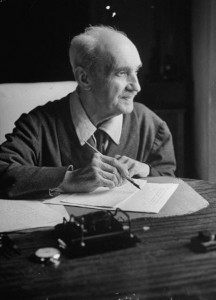 To William Gerber
To William Gerber
Via Santo Stefano Rotondo, 6
Rome. July 6, 1947
Dear Mr. Gerber,
The idea of a topical history of philosophy seems a good one, if opinion were so thoroughly disciplined that it recognised a certain number of precise problems, stated in unambiguous terms. Scholastic philosophers might make such a synopsis to their satisfaction. But isn’t the great difficulty today that no two persons or schools have the same problems or the same terms?
For instance, you suggest the old question of freedom of the Will or necessity. But now-a-days “necessity” and “causation” are ambiguous concepts. I should say, for instance, that no fact was or could be necessary, all existence being by definition contingent. Would it follow from this that I believe in freewill? Not at all. The ways of nature, are contingent in that logically they might just as well have been different or not to have been discernible at all, if no trope had ever been repeated. But tropes are repeated more or less: events to that extent are predictable on the assumption that these chance repetitions will continue regularly. There is therefore no traceable problem of freedom or necessity in the history of philosophy, but only confused contradictory talk on uncriticised presumptions.
Yours sincerely,
GSantayana
From The Letters of George Santayana: Book Seven, 1941-1947. Cambridge, MA: The MIT Press, 2006.
Location of manuscript: Collection of William Gerber, Washington D. C.
